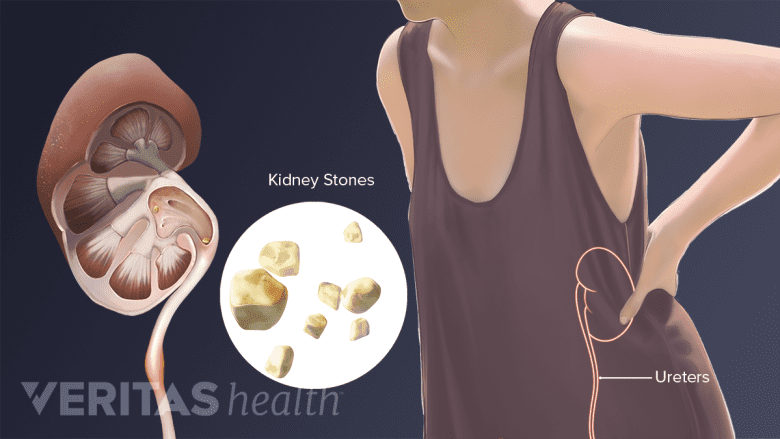There are numerous possible sources of lower right back pain in the organs of the mid-back, abdominal, or pelvic regions. Pain may start following inflammation or irritation of an internal organ, or may be a sign of infection. These conditions will usually produce other symptoms with lower right back pain that more specifically narrow down the source.
In This Article:
- A Guide to Lower Right Back Pain
- Lower Right Back Pain: Tissues & Spinal Structures
- Lower Right Back Pain from Internal Organs
- Lower Back Pain Causes and Symptoms Video
Several common internal causes of lower right back pain include:
Kidney Problems

Infection in the kidney may lead to lower right back pain.
Symptoms of kidney stones and a kidney infection can be very similar. Both conditions can cause low back pain on one side, as well as pain with urination and nausea and/or vomiting. Difficulty urinating is typically felt as a kidney stone moves in the kidney, through the ureters, and into the bladder and urinary tract, and a patient may notice blood in the urine. An infection in the right kidney can cause fever, local inflammation, and tenderness in the lower right back around the kidney.
Ulcerative Colitis

Persistent colon inflammation results in frequent abdominal cramping and lower right back pain.
This inflammatory bowel disease is characterized by persistent inflammation in the large intestine, also called the colon. Frequent abdominal cramping from ulcerative colitis can cause lower right back pain. Other symptoms includes chronic digestive problems such as diarrhea, rectal pain, weight loss, and fatigue.
Appendicitis

An inflamed or ruptured appendix can cause focal lower right back pain.
The appendix is located in the lower right hand side of the abdomen. If the appendix becomes inflamed, starts leaking or ruptures, it may cause symptoms that include lower right back pain. Symptoms vary, and there is debate about gradual onset or chronic appendicitis, but anecdotal evidence suggests that it is possible for an appendix to present chronic symptoms of lower right quadrant pain. A typical presentation is sudden-onset abdominal pain with a focal point in the lower right abdomen, with possible additional symptoms of fever, nausea and vomiting, and/or lower right back pain.
Gynecological Disorders

Endometriosis can cause sharp pain in the pelvic area, which may radiate to the lower back.
In women, various reproductive organs located in the pelvis may lead to lower right back pain. For example, endometriosis is a common condition that may create sporadic, sharp pain in the pelvic area that may radiate to the lower right back. Fibroids, or tissue masses that grow in and around the uterus, may cause lower right back pain as well as other symptoms such as abnormal menstruation, frequent urination, and/or pain with intercourse.
See 7 Back Pain Conditions That Mainly Affect Women
Pregnancy

Lower back pain is one of the symptoms of pregnancy, typically observed in later stages.
Lower right back pain, and low back pain in general, is common during pregnancy as the baby develops. Many women find different pain management methods helpful, which may include rest, exercise and stretching, and complementary therapies.
A variety of other internal conditions may also cause low back pain concentrated on the right side, so it is important to be aware of one’s symptoms when consulting with a doctor to obtain an accurate diagnosis and effectively plan treatments.
Less Common Causes of Lower Right Back Pain

Lower back pain may be an early symptom of liver disorders, such as hepatitis.
The following conditions may be common in the population, but are less likely to cause lower right back pain than pain in other areas, such as in the abdomen.
Lower right back pain may be an early symptom of the following:
Gallbladder inflammation
Gallbladder inflammation or dysfunction is typically marked by severe indigestion, particularly following meals. Gallbladder dysfunction typically causes upper right abdominal pain and right-sided back pain.
Liver problems
Pain related to the liver may be caused by inflammation (hepatitis), an abscess, liver scarring (cirrhosis), or an enlarged or failing liver. Symptoms of liver problems include pain in the upper right abdomen and/or back, fatigue, nausea or lack of appetite, and jaundice. Liver problems are relatively rare in persons not already at risk.
If the above conditions are the suspected cause of troubling symptoms, seeking prompt medical attention is advised.

